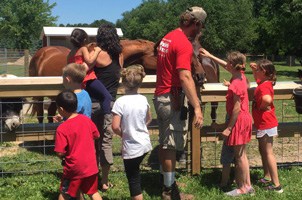
SEPTEMBER 2016
Natalie Loots
UMASH Evaluation Team
Research Assistant, Division of Environmental Health Sciences, University of Minnesota School of Public Health
Relationships can often be the true measure of a project’s success. The Minnesota Department of Health’s Healthy Fairs pilot project has certainly experienced success in this way. Healthy Fairs has been evolving since 2011 when the Minnesota Department of Health (MDH) was funded as part of the UMASH Center. Their initial work focused on keeping track of animal agriculture workers and their families who became ill in relation to contact with animal agriculture. The frequency of outbreaks observed at county fairs and other agritourism spots revealed the need for health and safety education for these venues. To do this, MDH applied for a UMASH pilot grant to create Healthy Fair workshops. They developed and hosted 5 workshops between 2013 and 2016 throughout the state. These workshops were created for county fair board members, FFA, 4H, fair veterinarians, and anyone else involved in planning or running a county fair in Minnesota. Once the Healthy Fairs workshop seemed successful, MDH turned their sights to educating those involved in agritourism by hosting Agritourism Workshops. Both workshops take a One Health approach and are co-hosted by MDH, the Board of Animal Health, the Environmental Health Division at MDH, and the Minnesota Department of Agriculture. The result is a workshop curriculum focused not only on the health risks posed to humans in these settings, but the risks to other animals and the environment as well.
Relationships built during these workshops are key as attendees share their challenges and successes around health and safety at their fair.
Carrie Klumb, senior epidemiologist at MDH, considers the relationships built during these workshops as the biggest success of the pilot. She commented that, “Even though epidemiologists in the Zoonotic Unit are not in the business of regulating, those in the county fair and agritourism world may not have realized this and were reluctant to work with us at first.” At the beginning of the first workshop in 2013 there was a skeptical silence among the group. By the end of the day however, the room was filled with energy and chatter as attendees shared their challenges and successes around health and safety at their fair.
These relationships have continued to grow each year. At the most recent workshop this spring, attendees were asked to bring a plan of their county fair and they went through them as a group; identifying potential health hazards and possible fixes, sharing and learning from each other. “Every single fair came up with something they needed to change on their own,” Ms. Klumb stated, “it’s great, the more we do these workshops the deeper we are able to go.”
MDH has also taken to doing personalized consultations with county fairs that experience an outbreak or want guidance in preventing one at their site. After an outbreak at a Minnesota county fair in 2014, the fair organizers installed running water per recommendation of MDH in order to prevent future health issues. The fair president also invited Ms. Klumb to appear on the local Ag radio show to share prevention messages with potential fair goers. The power of relationships was exemplified again during an E.coli O157 outbreak in 2014 caused by a traveling petting zoo visiting county fairs around the state. MDH was able to identify the source and put interventions in place to make sure no other fair goers were exposed to E. coli within two days. Ms. Klumb stated that, “We were able to call up the county fair presidents directly and find out information quickly. We would not have been able to identify the source and stop the outbreak so quickly if those relationships had not been in place.”
